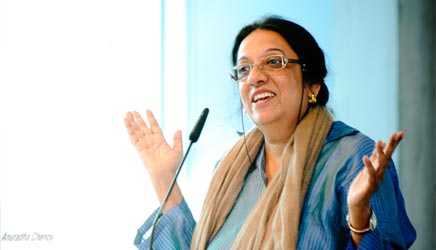Making the intersections between climate, peace and social justice come alive is critical for our struggle to protect the environment and climate, and on equally urgent basis – to protect its defenders. I express my solidarity to the thousands of climate and other activists who have been killed, continue to be incarcerated, have been labelled terrorists, anti-national, criminalised for their activism and for refusing to give in to regime interests when they ravage the environment in the name of development and call it nationalism. That is why an analysis linking climate change, militarism, and global dissent is critical.
First, militarism linked to material production is directly damaging the planet, climate and people in both its polluting and wasteful expenditure. Second, climate and ecological devastation brings on conflicts as researchers have credibly established. Third, and equally dangerous, is the civilian militarism, where elected especially right wing regimes use militarist nationalism to legitimise their authoritarianism and weaponise their narrative and agency against climate and other activists and progressive thinkers. They propagate militarised nationalism and patriotism to back and legitimise their use of force. Fourth and part of the above is the militarist response on the climate and conflict refugees on borders like from Honduras at the US-Mexico border; or Myanmar Bangladesh-India.
Three quick cases:
Columbia, Guatemala, Honduras, Philippines have been designated the most dangerous for climate activists as dozens killed every year as they try protest or protect their land. Philippines 114 environmental activists killed under the Duterte regime.
In India, For example 8956 people from Kudankulam Village were slapped with sedition cases for protesting against a proposed nuclear plant, since 2011 onwards. Some of these cases have been dropped, while others remain.
On the 88th day of farmers’ day and night protests against pro-corporate farm laws, a 21 year old climate activist Disha Ravi was picked up by the police for editing a tool kit put out by Greta Thunberg supporting the farmers. She was charged with “a conspiracy “to wage economic, social, cultural and regional war against India.”
In Brazil, the militarised government of civilian president Bolsonaro placed former general and vice president Mouråo in charge of ‘Operation Green Brazil’ so that the environmental ministry and experts take orders from soldiers. The Brazilian military has failed to stop Amazon fires. Bolsonaro’s response to any criticism is to evoke sovereignty: “The fires that burns most is our sovereignty”, meanwhile, the Brazilian Government has allowed mining and commercial farming on indigenous land. Brazilian military view indigenous people as “savages” in need of civilising, and as obstructing development.
This tells the story between activism, dominant narratives and the resisting citizen. Much of the global South from Brazil, Ethiopia, India, Pakistan, to Philippines have right wing civilian militarised governments, that lionise militarist symbols, signs and values, and make it fundamental to the idea of the nation, national security and nationalism. This is used as the cover, the justification to suppress, to legitimise legal or illegal methods and force, from vigilantiism to social media abuse.
Civil society resistance continues. In India, despite every tactic, thousands of farmers continue to protest pro-corporate farm laws in India. Since October 26, 2020, citizens sent two million emails to the government to oppose a draft Environmental Impact Assessment law that eased environment clearance for large projects. International solidarity and interlinking with social and peace movements is happening and is intrinsic to the struggle to stop climate change and save biodiversity.

